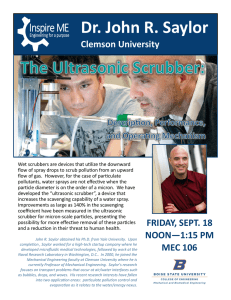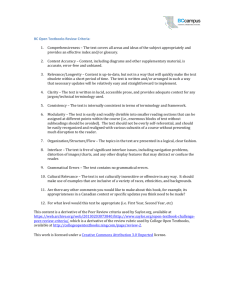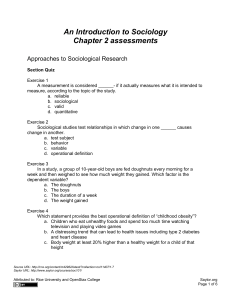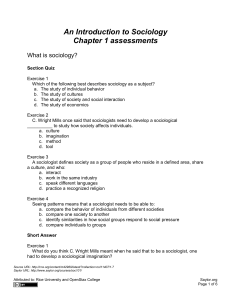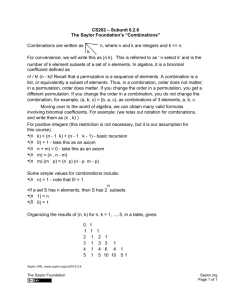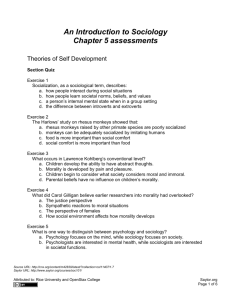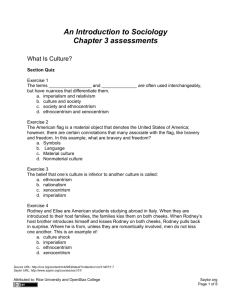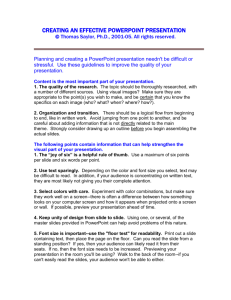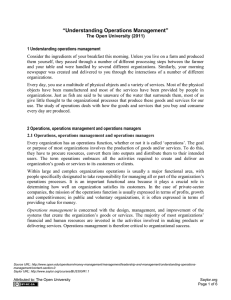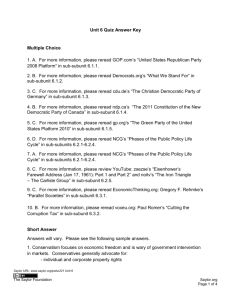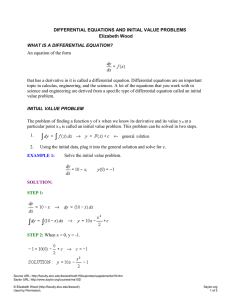An Introduction to Sociology Chapter 4 assessments
advertisement
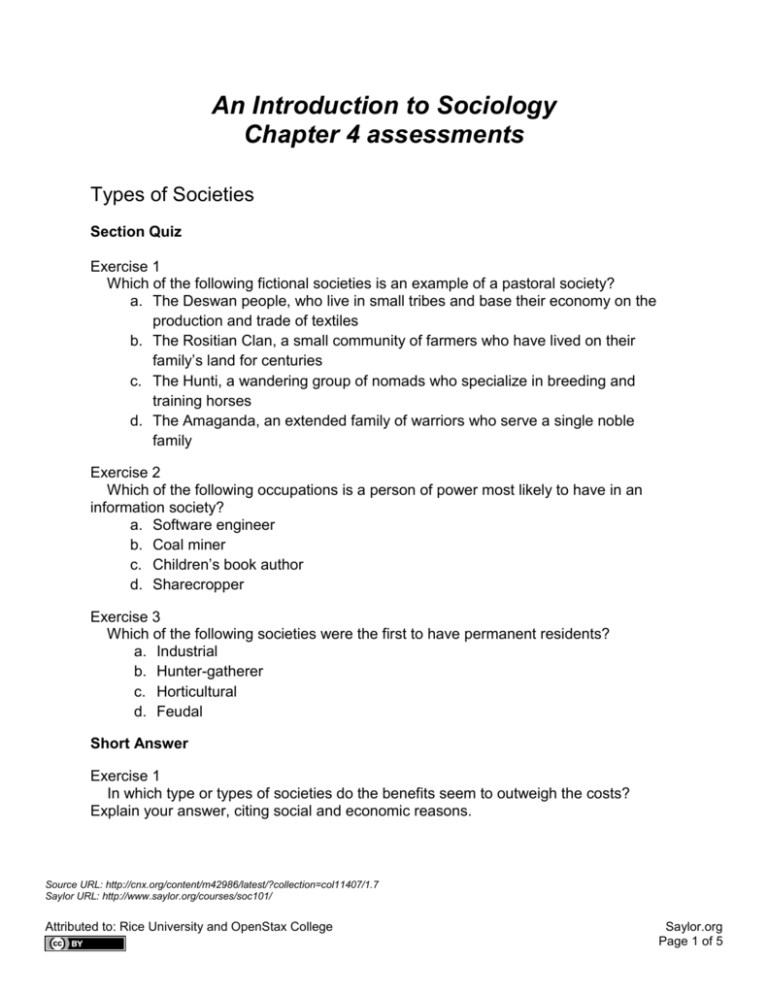
An Introduction to Sociology Chapter 4 assessments Types of Societies Section Quiz Exercise 1 Which of the following fictional societies is an example of a pastoral society? a. The Deswan people, who live in small tribes and base their economy on the production and trade of textiles b. The Rositian Clan, a small community of farmers who have lived on their family’s land for centuries c. The Hunti, a wandering group of nomads who specialize in breeding and training horses d. The Amaganda, an extended family of warriors who serve a single noble family Exercise 2 Which of the following occupations is a person of power most likely to have in an information society? a. Software engineer b. Coal miner c. Children’s book author d. Sharecropper Exercise 3 Which of the following societies were the first to have permanent residents? a. Industrial b. Hunter-gatherer c. Horticultural d. Feudal Short Answer Exercise 1 In which type or types of societies do the benefits seem to outweigh the costs? Explain your answer, citing social and economic reasons. Source URL: http://cnx.org/content/m42986/latest/?collection=col11407/1.7 Saylor URL: http://www.saylor.org/courses/soc101/ Attributed to: Rice University and OpenStax College Saylor.org Page 1 of 5 Exercise 2 Is Gerhard Lenski right in classifying societies based on technological advances? What other criteria might be appropriate based on what you have read? Theoretical Perspectives on Society Section Quiz Exercise 1 Organic solidarity is most likely to exist in which of the following types of societies? a. Hunter-gatherer b. Industrial c. Agricultural d. Feudal Exercise 2 According to Marx, the _____ own the means of production in a society. a. proletariat b. vassals c. bourgeoisie d. anomie Exercise 3 Which of the following best depicts Marx’s concept of alienation from the process of one’s labor? a. A supermarket cashier always scans store coupons before company coupons because she was taught to do it that way. b. A businessman feels that he deserves a raise, but is nervous to ask his manager for one; instead, he comforts himself with the idea that hard work is its own reward. c. An associate professor is afraid that she won’t be given tenure and starts spreading rumors about one of her associates to make herself look better. d. A construction worker is laid off and takes a job at a fast food restaurant temporarily, although he has never had an interest in preparing food before. Exercise 4 The Protestant work ethic is based on the concept of predestination, which states that ________. a. performing good deeds in life is the only way to secure a spot in Heaven Source URL: http://cnx.org/content/m42986/latest/?collection=col11407/1.7 Saylor URL: http://www.saylor.org/courses/soc101/ Attributed to: Rice University and OpenStax College Saylor.org Page 2 of 5 b. salvation is only achievable through obedience to God c. no person can be saved before he or she accepts Jesus Christ as his or her savior d. God has already chosen those who will be saved and those who will be damned Exercise 5 The concept of the iron cage was popularized by which of the following sociological thinkers? a. Max Weber b. Karl Marx c. Émile Durkheim d. Friedrich Engels Exercise 6 Émile Durkheim’s ideas about society can best be described as ________. a. functionalist b. conflict theorist c. symbolic interactionist d. rationalist Short Answer Exercise 1 Choose two of the three sociologists discussed here (Durkheim, Marx, Weber) and use their arguments to explain a current social event such as the Occupy movement. Do their theories hold up under modern scrutiny? Exercise 2 Think of the ways workers are alienated from the product and process of their jobs. How can these concepts be applied to students and their educations? Social Constructions on Reality Section Quiz Exercise 1 Mary works full-time at an office downtown while her young children stay at a neighbor’s house. She’s just learned that the childcare provider is leaving the country. Mary has succumbed to pressure to volunteer at her church, plus her ailing mother-in- Source URL: http://cnx.org/content/m42986/latest/?collection=col11407/1.7 Saylor URL: http://www.saylor.org/courses/soc101/ Attributed to: Rice University and OpenStax College Saylor.org Page 3 of 5 law will be moving in with her next month. Which of the following is likely to occur as Mary tries to balance her existing and new responsibilities? a. Role strain b. Self-fulfilling prophecy c. Status conflict d. Status strain Exercise 2 According to Peter Berger and Thomas Luckmann, society is based on ________. a. habitual actions b. status c. institutionalization d. role performance Exercise 3 Paco knows that women find him attractive, and he’s never found it hard to get a date. But as he ages, he dyes his hair to hide the gray and wears clothes that camouflage the weight he has put on. Paco’s behavior can be best explained by the concept of ___________. a. role strain b. the looking-glass self c. role performance d. habitualization Short Answer Exercise 1 Draw a large circle and then “slice” the circle into pieces like a pie, labeling each piece with a role or status that you occupy. Add as many statuses, ascribed and achieved, that you have. Don’t forget things like dog owner, gardener, traveler, student, runner, employee. How many statuses do you have? In which ones are there role conflicts? Exercise 2 Think of a self-fulfilling prophecy that you’ve experienced. Based on this experience, do you agree with the Thomas theorem? Use examples from current events to support your answer as well. Source URL: http://cnx.org/content/m42986/latest/?collection=col11407/1.7 Saylor URL: http://www.saylor.org/courses/soc101/ Attributed to: Rice University and OpenStax College Saylor.org Page 4 of 5 Answers Answers to “Types of Societies” Section Quiz 1.C, 2.A, 3.C. Answers to “Theoretical Perspectives on Society” Section Quiz 1.B, 2.C, 3.A, 4.D, 5.A, 6.A. Answers to “Social Constructions on Reality” Section Quiz 1.A, 2.A, 3.B. Source URL: http://cnx.org/content/m42986/latest/?collection=col11407/1.7 Saylor URL: http://www.saylor.org/courses/soc101/ Attributed to: Rice University and OpenStax College Saylor.org Page 5 of 5
